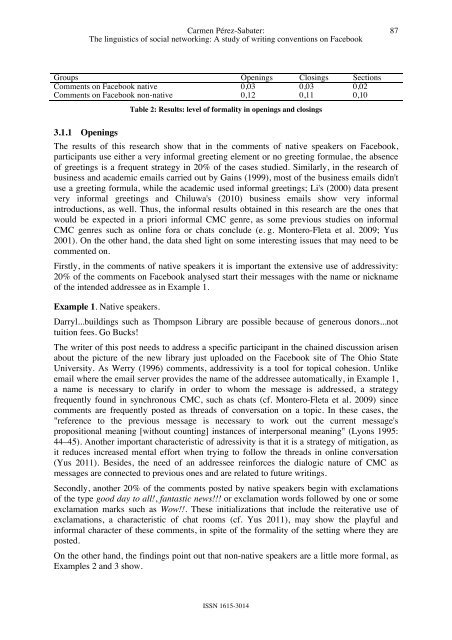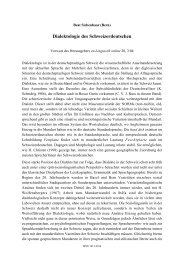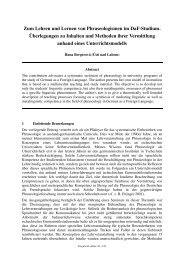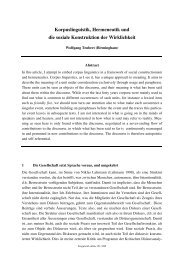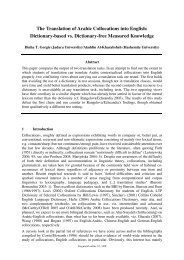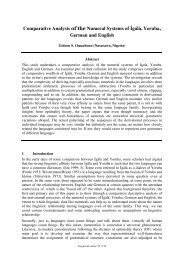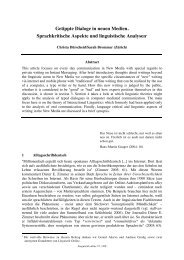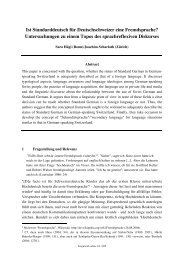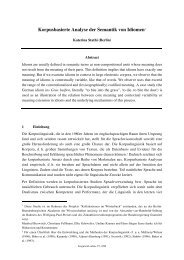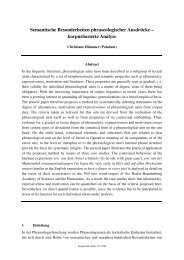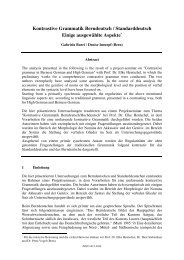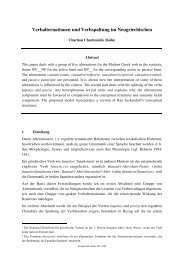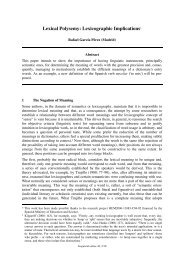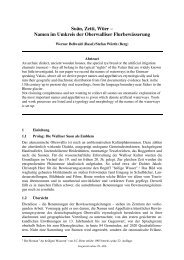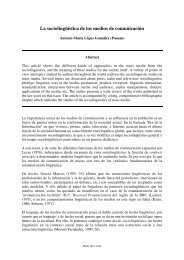A Study of Writing Conventions on Facebook - Linguistik online
A Study of Writing Conventions on Facebook - Linguistik online
A Study of Writing Conventions on Facebook - Linguistik online
You also want an ePaper? Increase the reach of your titles
YUMPU automatically turns print PDFs into web optimized ePapers that Google loves.
Carmen Pérez-Sabater:The linguistics <str<strong>on</strong>g>of</str<strong>on</strong>g> social networking: A study <str<strong>on</strong>g>of</str<strong>on</strong>g> writing c<strong>on</strong>venti<strong>on</strong>s <strong>on</strong> <strong>Facebook</strong>87Groups Openings Closings Secti<strong>on</strong>sComments <strong>on</strong> <strong>Facebook</strong> native 0,03 0,03 0,02Comments <strong>on</strong> <strong>Facebook</strong> n<strong>on</strong>-native 0,12 0,11 0,10Table 2: Results: level <str<strong>on</strong>g>of</str<strong>on</strong>g> formality in openings and closings3.1.1 OpeningsThe results <str<strong>on</strong>g>of</str<strong>on</strong>g> this research show that in the comments <str<strong>on</strong>g>of</str<strong>on</strong>g> native speakers <strong>on</strong> <strong>Facebook</strong>,participants use either a very informal greeting element or no greeting formulae, the absence<str<strong>on</strong>g>of</str<strong>on</strong>g> greetings is a frequent strategy in 20% <str<strong>on</strong>g>of</str<strong>on</strong>g> the cases studied. Similarly, in the research <str<strong>on</strong>g>of</str<strong>on</strong>g>business and academic emails carried out by Gains (1999), most <str<strong>on</strong>g>of</str<strong>on</strong>g> the business emails didn'tuse a greeting formula, while the academic used informal greetings; Li's (2000) data presentvery informal greetings and Chiluwa's (2010) business emails show very informalintroducti<strong>on</strong>s, as well. Thus, the informal results obtained in this research are the <strong>on</strong>es thatwould be expected in a priori informal CMC genre, as some previous studies <strong>on</strong> informalCMC genres such as <strong>on</strong>line fora or chats c<strong>on</strong>clude (e. g. M<strong>on</strong>tero-Fleta et al. 2009; Yus2001). On the other hand, the data shed light <strong>on</strong> some interesting issues that may need to becommented <strong>on</strong>.Firstly, in the comments <str<strong>on</strong>g>of</str<strong>on</strong>g> native speakers it is important the extensive use <str<strong>on</strong>g>of</str<strong>on</strong>g> addressivity:20% <str<strong>on</strong>g>of</str<strong>on</strong>g> the comments <strong>on</strong> <strong>Facebook</strong> analysed start their messages with the name or nickname<str<strong>on</strong>g>of</str<strong>on</strong>g> the intended addressee as in Example 1.Example 1. Native speakers.Darryl...buildings such as Thomps<strong>on</strong> Library are possible because <str<strong>on</strong>g>of</str<strong>on</strong>g> generous d<strong>on</strong>ors...nottuiti<strong>on</strong> fees. Go Bucks!The writer <str<strong>on</strong>g>of</str<strong>on</strong>g> this post needs to address a specific participant in the chained discussi<strong>on</strong> arisenabout the picture <str<strong>on</strong>g>of</str<strong>on</strong>g> the new library just uploaded <strong>on</strong> the <strong>Facebook</strong> site <str<strong>on</strong>g>of</str<strong>on</strong>g> The Ohio StateUniversity. As Werry (1996) comments, addressivity is a tool for topical cohesi<strong>on</strong>. Unlikeemail where the email server provides the name <str<strong>on</strong>g>of</str<strong>on</strong>g> the addressee automatically, in Example 1,a name is necessary to clarify in order to whom the message is addressed, a strategyfrequently found in synchr<strong>on</strong>ous CMC, such as chats (cf. M<strong>on</strong>tero-Fleta et al. 2009) sincecomments are frequently posted as threads <str<strong>on</strong>g>of</str<strong>on</strong>g> c<strong>on</strong>versati<strong>on</strong> <strong>on</strong> a topic. In these cases, the"reference to the previous message is necessary to work out the current message'spropositi<strong>on</strong>al meaning [without counting] instances <str<strong>on</strong>g>of</str<strong>on</strong>g> interpers<strong>on</strong>al meaning" (Ly<strong>on</strong>s 1995:44–45). Another important characteristic <str<strong>on</strong>g>of</str<strong>on</strong>g> adressivity is that it is a strategy <str<strong>on</strong>g>of</str<strong>on</strong>g> mitigati<strong>on</strong>, asit reduces increased mental effort when trying to follow the threads in <strong>on</strong>line c<strong>on</strong>versati<strong>on</strong>(Yus 2011). Besides, the need <str<strong>on</strong>g>of</str<strong>on</strong>g> an addressee reinforces the dialogic nature <str<strong>on</strong>g>of</str<strong>on</strong>g> CMC asmessages are c<strong>on</strong>nected to previous <strong>on</strong>es and are related to future writings.Sec<strong>on</strong>dly, another 20% <str<strong>on</strong>g>of</str<strong>on</strong>g> the comments posted by native speakers begin with exclamati<strong>on</strong>s<str<strong>on</strong>g>of</str<strong>on</strong>g> the type good day to all!, fantastic news!!! or exclamati<strong>on</strong> words followed by <strong>on</strong>e or someexclamati<strong>on</strong> marks such as Wow!!. These initializati<strong>on</strong>s that include the reiterative use <str<strong>on</strong>g>of</str<strong>on</strong>g>exclamati<strong>on</strong>s, a characteristic <str<strong>on</strong>g>of</str<strong>on</strong>g> chat rooms (cf. Yus 2011), may show the playful andinformal character <str<strong>on</strong>g>of</str<strong>on</strong>g> these comments, in spite <str<strong>on</strong>g>of</str<strong>on</strong>g> the formality <str<strong>on</strong>g>of</str<strong>on</strong>g> the setting where they areposted.On the other hand, the findings point out that n<strong>on</strong>-native speakers are a little more formal, asExamples 2 and 3 show.ISSN 1615-3014


